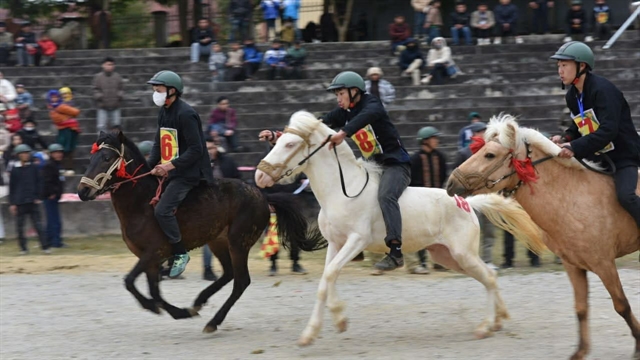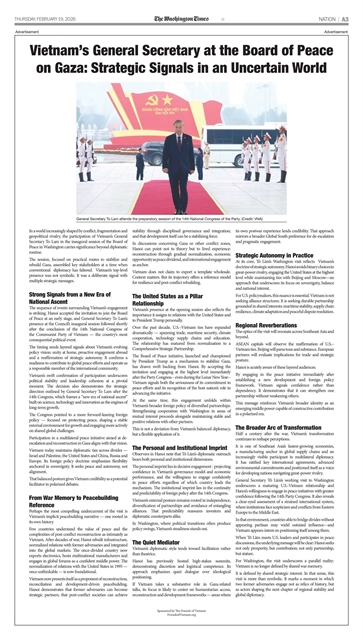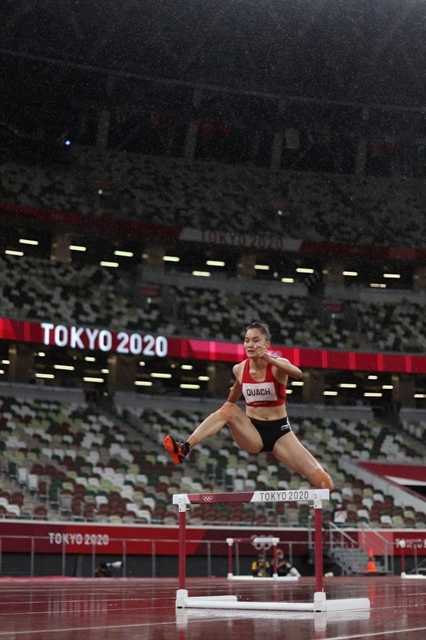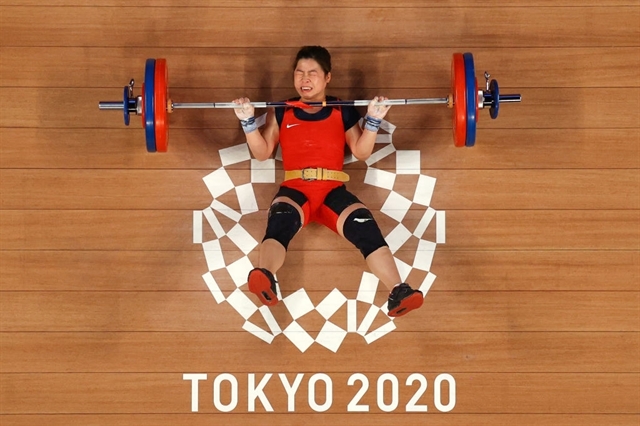 Sports
Sports

Việt Nam Olympics Team come home with no medal as expected. Their poor performance at the Olympics show the country's problems which must be fixed to lift Việt Nam up in the future
Olympics

|
| Quách Thi Lan of Việt Nam competes in the women's 400m hurdles semi-final on Monday at the Olympic Stadium in Tokyo, Japan. AFP/VNA Photo |
Thanh Hà
HÀ NỘI Under heavy rain, Quách Thị Lan tried her best but could not reach the final of the women's 400m hurdles at the Tokyo Olympics.
Lan was the last Vietnamese athlete at the Games but the most successful and her result was better than expected. A place in the semi-finals is the nation's highest result in athletics at the Olympics in history.
The Việt Nam Olympic team arrived home empty-handed after winning medals at all of the last three Olympics. Their incomplete mission highlighted Việt Nam's weaknesses and the amount of work that needs to be done to fix its problems.
Losses and hopes
Việt Nam sent 18 athletes to compete in 11 sports in the Olympics. None of them were tasked with winning a medal but sports officials still hoped that they would have at least a weightlifting bronze to bring home. Two athletes Thạch Kim Tuấn and Hoàng Thị Duyên showed great potential in the lead up to the competition.
However, both veteran Tuấn and newbie Duyên failed to shine as their performances were not as good in Tokyo as they had been at home. Injuries were partly blamed for their losses.
Senior shooter Hoàng Xuân Vinh earned his slot thanks to an invitation from the organisers to defend his title. Some believed he could win a medal but he had not hit his peak for several years and subsequently, he missed out.
The rest of the athletes came to the Olympics with a strong spirit but more to gain some real-world tournament experience for future competitions.
Việt Nam Sports Administration (VSA) deputy director Lê Hoàng Yến told Việt Nam News in an interview that there was a big gap between Việt Nam and the rest of the world.
There were, however, some highlights for the team.
Apart from Lan, boxer Nguyễn Văn Đương also had a good result. Đương was a nobody at his Olympic debut. But he defeated Azerbaijani Aliyev Tayfur, who placed fifth in the world championship in 2019, in his men's featherweight bout.
His win was a milestone for Việt Nam in a return to the Olympics after 33 years.
Duo Lường Thị Thảo and Đinh Thị Hảo also made history as they achieved the highest ranking ever for Việt Nam in rowing in an Olympics. They came in No 15 in the women's lightweight double sculls.
Badminton player Nguyễn Thùy Linh, world No 49, performed successfully with two wins over No 41 Qi Xuefei of France and No 46 Sabina Zaquet from Switzerland in the group round. She also played well before losing to world No 1 Tai Tzu-ying of Chinese Taipei and failing to advance.
After her first Olympics, Linh, 23, said she believed that she would quickly improve and would be equal to her highest-ranked rivals in the near future.
Solutions to be discussed
Compared to the Olympics in Brazil, Việt Nam's result in Tokyo made headlines in national media and raised questions in the sporting community.
Five years ago, the team came home with one gold and one silver, making the Rio Olympics the most successful ever.
This time, however, they brought nothing home and statistics showed that 10 out of the 18 athletes performed well under their full ability.
"I must confirm that the Olympics is a tough tournament for Việt Nam. We have to keep in mind that not all athletes are competing for medals as they are competing against world-class athletes. Just a few of them in specific sports have the opportunity to win a medal," said VSA deputy director Trần Đức Phấn.
"Gold and silver by Hoàng Xuân Vinh and some medals of other athletes are only highlights of our investment in sports in the past. This year, 18 Olympians showed Việt Nam's true position in the world," he said.
The chef de mission said there were reasons both in preparation for the event and during the competition for Việt Nam’s failure to bring home a medal and one of them was the COVID-19 pandemic.
Most athletes had no international intensive training course or tournament to sharpen their skills. Swimmer Nguyễn Huy Hoàng, for example, earned his slot very early but he could only do dryland workouts for months and our weightlifters were quarantined for 42 days after they took part in the qualifiers."
Deputy director Phấn affirmed that Việt Nam athletes were not in their best shape physically.
"We are shorter, thinner and weaker and we always feel nervous even shaking ahead of our competitions. We know the gap between us and our friends, therefore we knew what our result would be here. I am not happy with that but our athletes did their best," said Phấn.
Former SEA Games champion Vũ Thị Hương agreed it was poor preparation.
"If they had good preparation and were in good condition, they would be more confident to compete, and vice versa. Poor preparation here could be due to injuries," said retired Hương, who ran in the 100 metres in the 2008 Olympics.

|
| Hoàng Thị Duyên of Việt Nam falls during her competition in the women's 59kg class at the Tokyo International Forum on July 27. AFP/VNA Photo |
Other reasons could be mistakes made by the coaching board who had questionable tactics and failed to address the mental health of athletes.
"Tuấn's and Duyên's personal bests are in the Olympics' top three but they could not make it. Coaches may not do a good job as their tactics are not suitable and it could not help them perform well," said Nguyễn Trọng Hổ, VSA's director of the National Sports Complex.
According to Hổ who used to be a trainer, the role of the coach is important. They are the key to pushing athletes to achieve more and reach higher.
"We have many potential players but it seems that the training programmes are not good enough so our talent cannot grow. It is because of the coaching that does not meet their demands," Hổ said.
"Elite athletes need professional coaching methods which are different from that of young ones. In Việt Nam, most coaches go along with his/her athletes from the junior to senior period. It is okay if they can maintain it at a high level but if they do not develop in several years, a change in coaching is a must, otherwise their talents will be wasted."
Meanwhile Hoàng Vĩnh Giang, vice chairman of the Việt Nam Olympic Committee (VOC), said the investment for key athletes was not suitable.
"They must be given a professional training environment with advanced facilities, a good nutrition regime and quality coaches. Such an environment, and being surrounded by good athletes, would help Vietnamese athletes become more professional, thicken their experience, and strengthen their competitiveness. They would not be nervous when going to big Games," said Giang.
Hổ also said there needed to be greater investment in sport.
"There are several points that we need to focus on: main competitions, key sports, important events in these sports, and talented athletes. If we really want to reach the Olympic level, we must invest in Olympic sports, then sports of the Asian Games, then the SEA Games. It is hard to cover everything at once," he said.
Hổ who is the former head of the VSA’s Elite Sport 1 Department, said it is necessary to pick Olympics sports in which Việt Nam shows the most strength.
"Athletics and swimming are two sports where our chance of winning a medal is low. I don't want to say 'zero' because Vietnamese people's physique can't compare to their international friends. But weightlifting, badminton, archery, shooting and martial arts are different. If we focus on them methodically we could equally vie for medals at the Olympics," he said.
"Weightlifting and martial arts are key sports but we should choose weight categories up to 65kg for men and 60kg for women, which we are really good at. Pay attention to them, and give them all the best to convert them to our key sports in all competitions."
VOC Vice Chairman Giang, who brought many sports to Việt Nam, also suggested that the sport managers needed to change their mindset when selecting activities.
"A scientific system to select quality players is a must. It would help to pick players for suitable sports. If we can carry out these activities, we could either save money or have more effective investment in our athletes," said Giang.
Both Giang and Hổ agreed that in the near future it will be difficult for Việt Nam to find enough financial support for sport. It is necessary to have a long-term strategy and be patient.
VSA deputy director Phấn promised that meetings between sport managers, coaches and athletes would be held back in Việt Nam to discuss solutions.
Although the result was poor, Việt Nam has learnt lessons and will find a better way to compete in coming events.
"We need to set up a project that can be adapted to reality. It should include a clear point of view about investment, proposal plans and how to carry them out.”
"It is my hope that our athletes will be ready to vie for medals in the next Olympics in three or seven years,” said Phấn. VNS